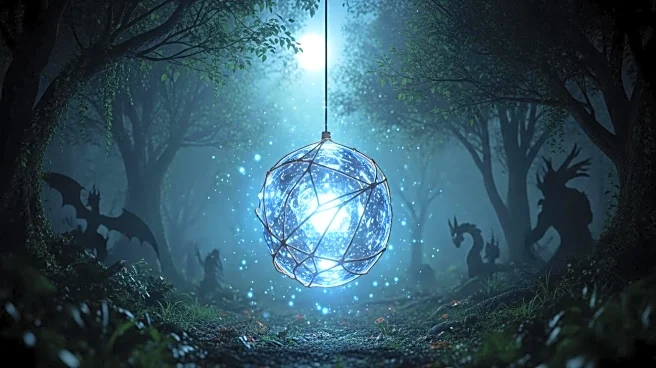What's Happening?
Forgotten Realms: Demon Stone, a hack-and-slash game originally developed by Stormfront Studios, has been re-released on Steam by SNEG. The game, which is set in a Dungeons & Dragons universe, offers players a fixed-camera button-masher experience, reminiscent of the PlayStation 2 classic The Lord of the Rings: The Two Towers. Players control three adventurers—a fighter, a sorcerer, and a half-drow rogue—caught in a war between two extraplanar armies: the githyanki and the slaad. The game features voice acting by Michael Clarke Duncan and narration by Patrick Stewart. Despite its single-player nature, Demon Stone allows players to switch between characters, each with unique abilities, to navigate battles and strategic choices.
Why It's Important?
The re-release of Forgotten Realms: Demon Stone on Steam provides PC gamers with access to a classic Dungeons & Dragons-themed game that was previously unavailable on this platform. This development is significant for fans of fantasy and role-playing games, as it expands the availability of beloved titles from the early 2000s. The game's unique setting and character dynamics offer a nostalgic experience for players who enjoy epic fantasy battles and strategic gameplay. Additionally, the involvement of notable actors in voice roles adds a layer of depth and engagement to the gaming experience.
What's Next?
With the re-release of Demon Stone, players can expect enhanced features such as separate volume controls for music and options for borderless and windowed display modes. However, the game remains locked to its original framerate of 30 fps, which may affect its reception among modern gamers accustomed to higher framerates. The re-release could spark interest in other classic games from the same era, potentially leading to more re-releases or remasters of similar titles. The gaming community may also engage in discussions about the preservation and accessibility of older games on contemporary platforms.
Beyond the Headlines
The re-release of Demon Stone highlights the ongoing interest in preserving and revitalizing classic video games for new audiences. It raises questions about the balance between maintaining original gameplay experiences and updating technical aspects to meet current standards. The game's single-player focus, despite the popularity of co-op modes in similar games, may also prompt discussions about the evolution of gaming preferences and the role of narrative-driven experiences in the industry.










